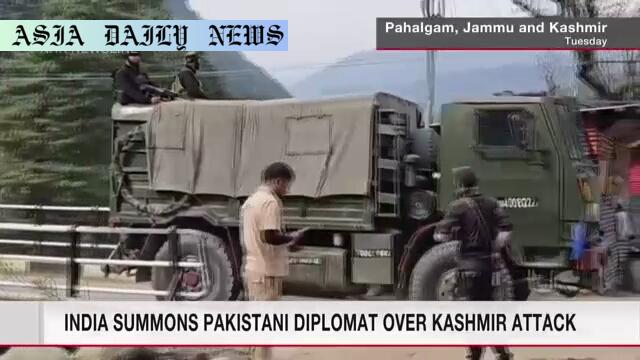Kashmir: India summons Pakistani diplomat following attack claiming 26 lives, as cross-border links and terrorism connections emerge.

Fatal Attack Shocks Kashmir
The Kashmir region, a long-disputed area claimed by both India and Pakistan, witnessed a tragic escalation in violence on Tuesday. Militants opened fire on a group of innocent tourists in the Jammu-Kashmir area, leaving 26 people dead. The attack has sent shockwaves throughout the region and the world, leading India to take immediate diplomatic and investigative action. Police have classified the incident as a terrorist attack, heightening concerns over the rising tension in the area.
India’s Diplomatic Actions
In response to the attack, India summoned Pakistan’s top diplomat in New Delhi late on Wednesday. According to India’s Foreign Secretary Vikram Misri, investigations have pointed to cross-border linkages connected to the terrorist strike. Misri also outlined India’s intention to impose specific measures against Pakistan, holding it accountable for its purported role in fostering or supporting the militants involved. India’s stance on terrorism has been increasingly assertive, especially when linked to its neighboring rival, Pakistan.
The Role of The Resistance Front
The militant organization, The Resistance Front, has publicly claimed responsibility for the attack. Indian security agencies have identified this group as potentially being an extension of the Pakistan-based Lashkar-e-Taiba (LeT), a group infamous for its role in the 2008 Mumbai attacks. The allegations linking Pakistan-based groups to the current tragedy add another layer of complexity to the already fragile relationship between the two nuclear-armed neighbors.
Pakistan’s Upcoming Response
Reacting to India’s accusations, Pakistan has called for a meeting of its National Security Committee on Thursday to address the situation. The country has often denied claims linking it to extremist activity across the border, citing its own efforts to combat terrorism internally. However, India continues to allege Pakistan’s tacit support for groups that operate in contesting areas like Jammu and Kashmir, further deepening mistrust and conflict in the region.
History of the Disputed Region
The Kashmir region remains one of the world’s most complex and long-standing territorial disputes. Both India and Pakistan claim full ownership of the region, yet only administer parts of it. Over the years, this geopolitical tension has led to multiple wars, countless skirmishes, and regular terrorist activities. The most recent attack is yet another stark reminder of the human cost of unresolved conflicts.
The Impact on Civilians
Attacks like the one witnessed in Jammu-Kashmir have devastating consequences for civilians who reside in the region. The loss of 26 innocent lives underscores the dangers people in these contested territories face, even when engaging in simple activities like tourism. The global community has long called for lasting peace in Kashmir, but political tension continues to overshadow such efforts.
Global Implications
This incident will likely draw international attention given its scale and implications. Cross-border terrorism has been a growing concern worldwide, and incidents like this further emphasize the importance of addressing and combating extremist ideologies. The international community must push for more dialogue between India and Pakistan while supporting efforts aimed at de-escalating tensions and fostering peace.
Ensuring Accountability
The need for accountability in acts of terrorism cannot be overstated. Whether through diplomatic pressure, international sanctions, or other forms of oversight, nations linked to extremist activities must be held responsible. This will not only prevent further attacks but also pave the way for more secure and peaceful environments globally.
Commentary
A Destructive Legacy of Conflict
The recent terrorist attack in Kashmir is yet another tragic reminder of the violence and instability that has plagued the region for decades. The targeted killing of tourists—a group symbolizing peace and unity—highlights the devastating human impact of political disputes. Such incidents speak to the urgent need for a peaceful resolution, as the ongoing conflict continues to claim innocent lives.
The Challenges of Accountability
For years, the Kashmir issue has been marred with allegations, counter-allegations, and a lack of accountability. While India seeks to hold Pakistan responsible for fostering militant groups like Lashkar-e-Taiba, Pakistan denies these accusations and points to its internal struggles against extremism. This cycle of blame not only hampers any effort at long-term peace but allows such catastrophic incidents to repeat.
A Call for International Involvement
The global community must step up its involvement in the Kashmir issue. A neutral international body dedicated to facilitating dialogue between India and Pakistan could play a pivotal role in reducing tensions. Ultimately, fostering trust and ensuring the safety of civilians across the region should be the primary motivation behind international involvement.
The Role of Civil Society
Peace in Kashmir will not come solely from government actions. Civil society, cultural exchanges, and grassroots initiatives must be encouraged on both sides of the border to promote understanding and cooperation. Dialogue at all levels, from top-level diplomacy to community-driven efforts, is essential for breaking the cycle of violence.
Conclusion
The horrific attack in Jammu-Kashmir is a stark reminder of the urgency needed to address this unresolved conflict. Until the underlying issues are addressed with seriousness and empathy, the region will remain vulnerable to further tragedies of this nature.


